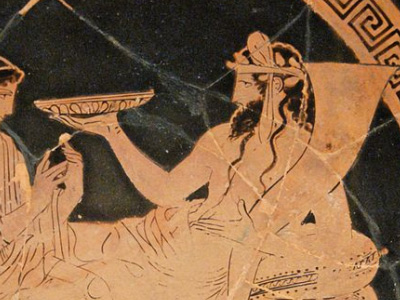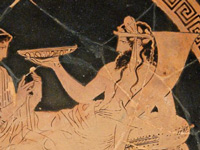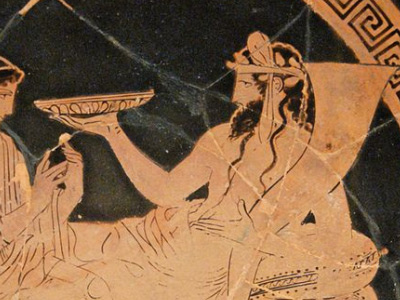Hades

Hades (/ˈheɪdiːz/; Greek: ᾍδης Háidēs) was the ancient Greek chthonic god of the underworld, which eventually took his name.
In Greek mythology, Hades was regarded as the oldest son of Cronus and Rhea, although the last son regurgitated by his father. He and his brothers Zeus and Poseidon defeated their father's generation of gods, the Titans, and claimed rulership over the cosmos. Hades received the underworld, Zeus the sky, and Poseidon the sea, with the solid earth—long the province of Gaia—available to all three concurrently. Hades was often portrayed with his three-headed guard dog Cerberus.
The Etruscan god Aita and Roman gods Dis Pater and Orcus were eventually taken as equivalent to the Greek Hades and merged as Pluto, a Latinization of his euphemistic Greek name Plouton.
Greek god of the underworld
In Greek mythology, Hades the god of the underworld, was a son of the Titans Cronus and Rhea. He had three sisters, Demeter, Hestia, and Hera, as well as two brothers, Zeus, the youngest of the three, and Poseidon. Upon reaching adulthood, Zeus managed to force his father to disgorge his siblings. After their release, the six younger gods, along with allies they managed to gather, challenged the elder gods for power in the Titanomachy, a divine war. The war lasted for ten years and ended with the victory of the younger gods. Following their victory, according to a single famous passage in the Iliad (xv.187–93), Hades and his two brothers, Poseidon and Zeus, drew lots for realms to rule. Zeus received the sky, Poseidon received the seas, and Hades received the underworld, the unseen realm to which the souls of the dead go upon leaving the world as well as any and all things beneath the earth. Some myths suggest that Hades was dissatisfied with his turnout, but had no choice and moved to his new realm.
Hades obtained his wife and queen, Persephone, through abduction at the behest of Zeus. This myth is the most important one Hades takes part in; it also connected the Eleusinian Mysteries with the Olympian pantheon, particularly as represented in the Homeric Hymn to Demeter, which is the oldest story of the abduction, most likely dating back to the beginning of the 6th Century BC. Helios told the grieving Demeter that Hades was not unworthy as a consort for Persephone:
Aidoneus, the Ruler of Many, is no unfitting husband among the deathless gods for your child, being your own brother and born of the same stock: also, for honor, he has that third share which he received when division was made at the first, and is appointed lord of those among whom he dwells.
— Homeric Hymn to Demeter
Despite modern connotations of death as evil, Hades was actually more altruistically inclined in mythology. Hades was often portrayed as passive rather than evil; his role was often maintaining relative balance. That said, he was also depicted as cold and stern, and he held all of his subjects equally accountable to his laws. Any other individual aspects of his personality are not given, as Greeks refrained from giving him much thought to avoid attracting his attention.
Hades ruled the dead, assisted by others over whom he had complete authority. The House of Hades was described as full of "guests," though he rarely left the Underworld. He cared little about what happened in the Upperworld, as his primary attention was ensuring none of his subjects ever left.
He strictly forbade his subjects to leave his domain and would become quite enraged when anyone tried to leave, or if someone tried to steal the souls from his realm. His wrath was equally terrible for anyone who tried to cheat death or otherwise crossed him, as Sisyphus and Pirithous found out to their sorrow. While usually indifferent to his subjects, Hades was very focused on the punishment of these two people; particularly Pirithous, as he entered the underworld in an attempt to steal Persephone for himself, and consequently was forced onto the "Chair of Forgetfulness". Another myth is about the Roman god Asclepius who was originally a demigod, fathered by Apollo and birthed by Coronis, a Thessalian princess. During his lifetime, he became a famous and talented physician, who eventually was able to bring the dead back to life. Feeling cheated, Plouton persuaded Zeus to kill him with a thunderbolt. After his death, he was brought to Olympus where he became a god. Hades was only depicted outside of the Underworld once in myth, and even that is believed to have been an instance where he had just left the gates of the Underworld, which was when Heracles shot him with an arrow as Hades was attempting to defend the city of Plyus. After he was shot, however, he traveled to Olympus to heal. Besides Heracles, the only other living people who ventured to the Underworld were also heroes: Odysseus, Aeneas (accompanied by the Sibyl), Orpheus, who Hades showed uncharacteristic mercy towards at Persephone's persuasion, who was moved by Orpheus' music, Theseus with Pirithous, and, in a late romance, Psyche. None of them were pleased with what they witnessed in the realm of the dead. In particular, the Greek war hero Achilles, whom Odysseus conjured with a blood libation, said:
O shining Odysseus, never try to console me for dying.
I would rather follow the plow as thrall to another
man, one with no land allotted to him and not much to live on,
than be a king over all the perished dead.
— Achilles' soul to Odysseus. Homer, Odyssey
Cult
Hades, as the god of the dead, was a fearsome figure to those still living; in no hurry to meet him, they were reluctant to swear oaths in his name, and averted their faces when sacrificing to him. Since to many, simply to say the word "Hades" was frightening, euphemisms were pressed into use. Since precious minerals come from under the earth (i.e., the "underworld" ruled by Hades), he was considered to have control of these as well, and was referred to as Πλούτων (Plouton, related to the word for "wealth"), Latinized as Pluto. Sophocles explained referring to Hades as "the rich one" with these words: "the gloomy Hades enriches himself with our sighs and our tears." In addition, he was called Clymenus ("notorious"), Polydegmon ("who receives many"), and perhaps Eubuleus ("good counsel" or "well-intentioned"), all of them euphemisms for a name that was unsafe to pronounce, which evolved into epithets.
He spent most of the time in his dark realm. Formidable in battle, he proved his ferocity in the famous Titanomachy, the battle of the Olympians versus the Titans, which established the rule of Zeus.
Feared and loathed, Hades embodied the inexorable finality of death: "Why do we loathe Hades more than any god, if not because he is so adamantine and unyielding?" The rhetorical question is Agamemnon's. He was not, however, an evil god, for although he was stern, cruel, and unpitying, he was still just. Hades ruled the Underworld and was therefore most often associated with death and feared by men, but he was not Death itself — the actual embodiment of Death was Thanatos, although Euripides' play "Alkestis" states fairly clearly that Thanatos and Hades were one and the same deity, and gives an interesting description of him as dark-cloaked and winged, Hades also possessed a title that refers to him as "Hesperos Theos" ("God of Death and Darkness").
When the Greeks propitiated Hades, they banged their hands on the ground to be sure he would hear them. Black animals, such as sheep, were sacrificed to him, and the very vehemence of the rejection of human sacrifice expressed in myth suggests an unspoken memory of some distant past. The blood from all chthonic sacrifices including those to propitiate Hades dripped into a pit or cleft in the ground. The person who offered the sacrifice had to avert his face.
One ancient source says that he possessed the Cap of invisibility. His chariot, drawn by four black horses, made for a fearsome and impressive sight. His other ordinary attributes were the narcissus and cypress plants, the Key of Hades and Cerberus, the three-headed dog. In certain portraits, snakes also appeared to be attributed to Hades as he was occasionally portrayed to be either holding them or accompanied by them, this is believed to hold significance as in certain classical sources Hades ravished Kore in the guise of a snake, who went on to give birth to Zagreus-Dionysus. While bearing the name 'Zeus', Zeus Olympios, the great king of the gods, noticeably differs from the Zeus Meilichios, a decidedly Chthonian character, often portrayed as a snake, and as seen beforehand, they cannot be different manifestations of the same god, in fact whenever 'another Zeus' is mentioned, this always refers to Hades. Zeus Meilichios and Zeus Eubouleus are often referred to being alternate names for Hades.
The philosopher Heraclitus, unifying opposites, declared that Hades and Dionysus, the very essence of indestructible life (zoë), are the same god. Among other evidence Kerényi notes that the grieving goddess Demeter refused to drink wine, which is the gift of Dionysus, after Persephone's abduction, because of this association, and suggests that Hades may in fact have been a "cover name" for the underworld Dionysus. He suggests that this dual identity may have been familiar to those who came into contact with the Mysteries. One of the epithets of Dionysus was "Chthonios", meaning "the subterranean". The role of unifying Hades, Zeus and Dionysus as a single tripartite god was used to represent the birth, death and resurrection of a deity and to unify the 'shining' realm of Zeus and the dark underworld realm of Hades.
LEGENDS

RESOURCES
This article uses material from the Wikipedia article "Hades", which is released under the Creative Commons Attribution-Share-Alike License 3.0.
© Stories Preschool. All Rights Reserved.









